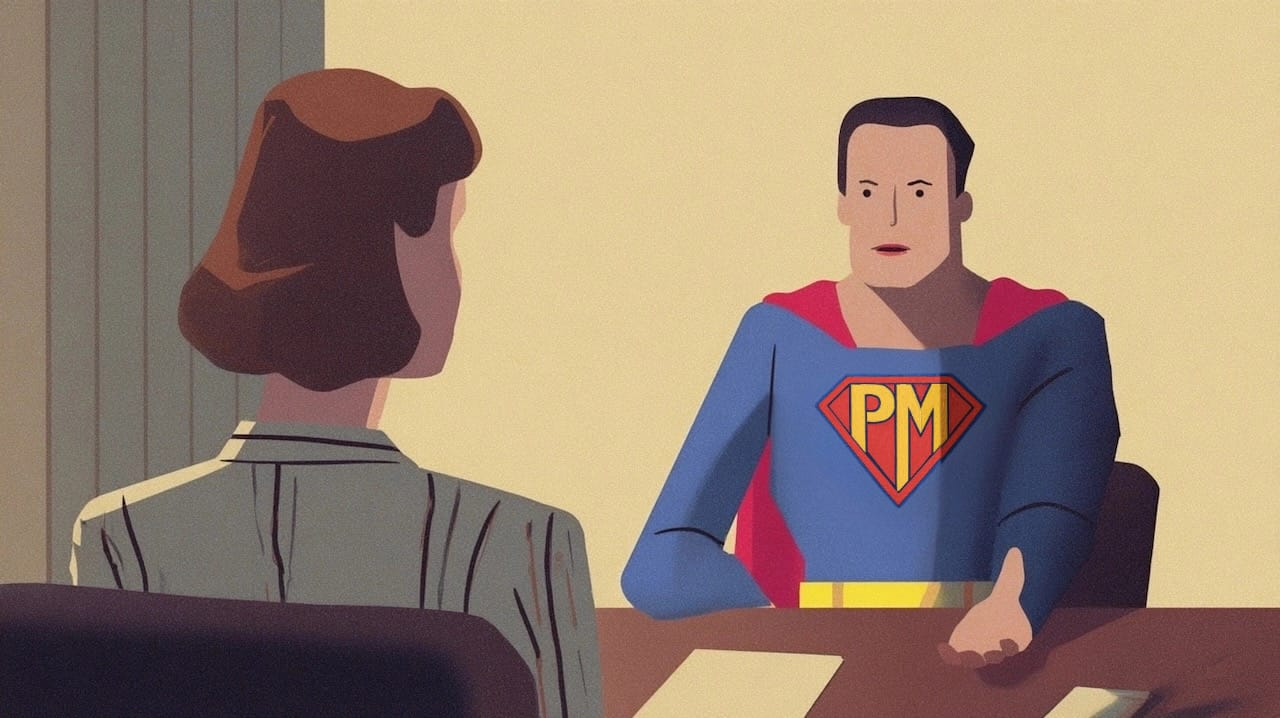How to hire a rockstar PM in deep tech (and filter out the mediocre ones)

In a company where technical complexity is high, hiring a great Product Manager is tough. It takes time. It takes method.
Nobody wants someone who’ll just "do the job." You want someone who will actually move things forward. Someone you can rely on. While avoiding wasting time with candidates who seem promising but who won't bring anything to the table.
In this article, I’ll explain how I’ve hired dozens of great product people in complex technical environments, and what weak signals I look for to spot top PMs.
Before the interview
Don’t generate your job description with AI. It shows.
I’m convinced that 80% of today’s job offers are, to some extent, generated by an LLM.
Using an LLM is not the problem. The problem is when it shows. And it shows a lot.
Using a chatbot to refine the tone or polish your writing? Fine. But you have to be careful not to let the result become a mess of corporate giberish, without no real insight on what you, the recruiter, are actually looking for.
Everything starts with a hyper-specific job description that reflects exactly what you expect from a candidate. Why? For two reasons:
- Filter candidates (obvious, I know). You’re not looking for just any product person. Maybe you need a business school graduate with B2B SaaS experience. Or an engineer who’s worked in IoT. Spell it out and put it in writing. And if you don’t know what you’re looking for, you have bigger problems. You have to think & clarify. Or you’ll spend months chasing unicorns.
- Leave tiny little breadcrumbs. Hansel and Gretel would be killer PMs. A good job post is full of subtle details that great candidates will use to stand out. A smart PM will tailor their resume to your offer, highlight relevant experiences, and, most importantly, they will reuse your keywords. If you can spot them, that’s a strong signal they care and put in the effort.
A good PM should know how to tell a story and their resume is their first product. It should be one page max, sharp, focused, and tailored to your offer.
Beautiful writing is cheap now. Substance is where the value is. If they don’t bother making your life easier as a recruiter, how will they empathize with your users?
Pro tip: nuke any CVs blatently written by LLMs (yes—the em dash is a dead giveaway, which is too bad cause I kinda liked it).
Never skip the fit call

Next comes the fit call.
If you have HR people, let them do it. They’re at the front line. They spot false positives and filter creative resume storytellers. Involve them from day one.
For junior profiles, this call is non-negotiable. For seniors, I recommend combining with a quick business fit call. Not to dig into experience, just to check global alignment.
Now comes the main event: the business case.
The interview
The business case separates the good from the greats
I love business cases. I love listening to them. I love writing them. Life itself is a giant business case if you think about it.
A good business case is NOT a polished Notion template. It’s just one sentence + a time constraint. That’s it.
One of my favorites:
“You’re pitching your CEO a new product or a new feature for one of our existing products. You have 10 minutes, in English, and you will present it next week.”
Why so vague? Why mandatory English? To see how they handle ambiguity and stress (and yes, if they're not a native speaker, it's a great way to test their English).
And why 10 minutes? Because impact matters. The candidate must do more with less.
Alright, the day of the interview has now arrived. You’re about to hear their business case (lucky you!). It's now time to test the four traits that define a product rockstar:
- Curiosity
- Empathy
- Drive
- Technical literacy
The business case is your main tool. But you’ll also have to obviously rely on their past experiences and resume. Let’s break down each trait.
Curiosity: the PM’s engine

PMs are curious by nature. They need a strong tech and business culture, basic coding literacy, and solid understanding of major business metrics. A vague description for the business case should pick their curiosity. And they should show it.
Resources on your company are endless (Google, deep search tools, podcasts, LinkedIn…). The best candidates will unearth info even you didn’t know about your company.
You’ll quickly spot the difference between someone who found a 2008 pitch of your CEO on YouTube and tailored their case accordingly, compared to someone who copy-pasted your “About” page into Claude Sonnet.
You also have to pay attention to the scope they choose. Applying for a SaaS PM role but pitching a mobile game app? Wrong candidate. This choice says a lot.
Good candidates will show structured discovery, sharp persona analysis, strong impact estimation, and a high-level delivery plan. Like the “how many ping-pong balls fit in a bus” question: the answer matters less than the reasoning.
During the pitch, interrupt, challenge, push back. They’ll be under pressure. But that’s the point. If they crumble now, imagine them facing your biggest investor when they learn that your product is 6 months late…
Also, ask how much time they spent on the case. If they say 12 hours, red flag. They’re chasing exhaustivity, not impact. The sweet spot: 2-3 hours.
The goal isn’t to crush them. You’re testing their balance of openness, empathy, and firmness. Which leads us to…
Empathy: what makes them last

The queen of soft skills. Empathy is non-negotiable for a PM. They’ll need:
- Empathy for users (obviously)
- Empathy for their management (up and down)
- Empathy for cross-functional teams (sales, support, ops… each with their own language)
- Empathy for R&D (understand, respect, challenge)
To test this, you have to use situational questions. An example:
“What would you do if your dev team can’t deliver a key feature for a critical sales meeting next week?”
Listen carefully. Will they protect the devs? Will they try to save the prospect? To find a creative compromise?
What you want:
- A candidate who creates mutual understanding between your team and the client.
- Someone who will try to distinguish the difference between “hard deadlines” and “nice to haves.”
- A PM who engages devs in product discovery to motivate around deadlines, not just impose them.
What you don’t want:
- A candidate desperate to save the scope at all costs by crushing their team.
Empathy is key. But empathy without drive is just being nice. Which brings us to…
Drive: what gives them impact

Drive is what separates a good PM from a real leader. You’re not hiring a ticket manager. You want a product captain.
A strong PM aligns teams, builds momentum, and drives action. Not through authority, but through energy.
How to spot it? Ask for stories:
“Tell me about a time you had to align a reluctant team around a tough priority.”
“What’s the first thing you do when you’re handed a new product?”
Look for energy that brings people together. For someone who brings people together. Someone who listens, understands, and knows how to say no.
To do that, they’ll need credibility with their team. And to have credibility, they'll need...
Technical literacy: what makes them credible

I said it upfront: this article is about hiring PMs in companies built on scientific or technological breakthroughs (deep tech, bioscience, hardware...).
Now, let me be clear. What I’m about to say won’t be a popular opinion. And I don’t care. You’ve been warned.
A PM in a tech-heavy, R&D-driven company must deeply understand technical challenges. Period. And in my experience, the best profiles in these environments have scientific backgrounds. People who’ve worked with complex stacks, who have an engineering degree, a scientific master’s, or at least a rock-solid technical foundation. For this job, you'll want an engineer, not a sales person.
How will they able to challenge a developer if they think Python is just a snake? How will they survive a prospect telling you your LLM temperature is too low (hint: it’s not about closing windows)? This is a credibility game. And they can’t fake it.
Obviously, not every PM has to be a Polytechnique graduate. But in a deep tech company, with years of R&D and heavy technical investment, you cannot compromise on technical depth.
So during the business case, make sure you get architecture diagrams. Challenge them. You’re not testing their knowledge of your stack. You’re testing how they think and what they know.
(And no, this does not apply to low-code SaaS B2B company or mobile apps startups, where business sensitivity might weigh in more.)
Conclusion: hire slow, move fast (methodically)
Hiring a strong PM is not about luck. It’s a method.
Each step is a filter:
- A precise offer
- A rigorous CV screening
- A revealing business case
- Sharp and targeted questions
Do this right, and you’ll avoid errors. You’ll build a product team that delivers, scales, and stays healthy.
Bonus: my favorite generalist questions
To go further, here’s my go-to list of generalist questions I always have in my Notes app when I'm interviewing:
- “What would your dev team say about you?”
- “Same question for your business stakeholders?”
- “What’s your PM superpower? The thing people rely on you for in complex projects?”
- “Who’s the most impressive person you’ve worked with on a deep tech project? What made them stand out?”
- “Which technical profiles do you collaborate best with? Which ones are harder? Why?”
- “Give me a concrete example where you took initiative and pushed a complex project beyond expectations.”
- “What product culture best practice from your previous company would you replicate here? And what mistake would you avoid at all costs?”
